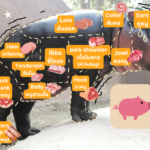| I | - คำสรรพนามเอกพจน์บุรุษที่1: ผม, ดิฉัน, ข้าพเจ้า, หน, กระหม่อม [Lex2]
- พยัญชนะภาษาอังกฤษตัวที่ 9[Lex2]
- เสียงสระในภาษาอังกฤษ[Lex2]
- (ไอ) พยัญชนะอังกฤษตัวที่ 9เป็นสระด้วย [Hope]
- /AY1/ [CMU]
- (n (count),pron) /aɪ/ [OALD]
- (n (count)) /'aɪ/ [OALD]
|
| wasn't | - (วอส'เซิน) abbr. was not [Hope]
- /W AA1 Z AH0 N T/ [CMU]
- /W AH1 Z AH0 N T/ [CMU]
- (v) /w'ɒznt/ [OALD]
|
| referring to | [refer to] - พูดถึง: เอ่ย, บ่งถึง [Lex2]
- หมายความว่า: หมายว่า, มีความหมายว่า [Lex2]
- อ้างถึง: เอ่ยถึง, เขียนถึง [Lex2]
- อ้าง (ข้อมูล) ถึง[Lex2]
- เกี่ยวข้องกับ: สัมพันธ์กับ [Lex2]
- ส่งถึง[Lex2]
- ถาม (ข้อมูล) จาก (บางคน)[Lex2]
- จัดอยู่ในกลุ่ม: เป็นของ [Lex2]
|
| the | - คำนำหน้านามชี้เฉพาะ[Lex2]
- พระเจ้า[Lex2]
- n. วันอาทิตย์ [Hope]
- (adv) ถึงเพียงนั้น,ในกรณีนั้น,ที่เข้าใจกันแล้ว [Nontri]
- /DH AH0/ [CMU]
- /DH AH1/ [CMU]
- /DH IY0/ [CMU]
- (adv,def. article) /ðə/ [OALD]
|
| wheelchair | - เก้าอี้รถเข็นสำหรับคนป่วยหรือคนพิการ[Lex2]
- (วีล'แชร์) เก้าอี้ล้อเข็นของคนไข้ [Hope]
- /W IY1 L CH EH2 R/ [CMU]
- /HH W IY1 L CH EH2 R/ [CMU]
- (n (count)) /w'iːltʃɛəʳr/ [OALD]
|
| 私 | - (あたし(P);あたくし;あたい;あて) (pn,adj-no) (fem) I; me; (P) [EDICT]
- (あっし;わっち;わっし) (pn,adj-no) I (mainly used by working men); myself [EDICT]
- (わい;わて) (pn) (1) (arch) (ksb [EDICT]
- (わたい) (n) (arch) (ktb [EDICT]
- (わたし(P);わたくし(P)) (pn,adj-no) (1) I; me; (n,adj-no) (2) (わたくし only) private affairs; personal matter; secrecy; (3) (わたくし only) selfishness; (P) [EDICT]
- (わらわ) (pn,adj-no) (arch) (hum) (fem) I; me [EDICT]
- (わし) (pn,adj-no) (uk) I; me (used by elderly males) [EDICT]
- (sī, ㄙ) personal; private; selfish [CE-DICT]
|
| 車椅子 | - (くるまいす) (n) wheelchair; folding push-chair; (P) [EDICT]
|
| を | - () (prt) (arch) (See を) marks object of action, etc. (also adds emphasis) [EDICT]
|
| 引き合い | - (ひきあい) (n) (1) reference; comparison; example; (2) inquiry; enquiry; (3) witness; being involved in a court case; deal; (P) [EDICT]
|
| に | - (二) สอง [LongdoJP]
- () (prt) indicates location of action (formal literary form of "de"); at; in; (P) [EDICT]
- () (prt) (See に,は) for (in regard to); in order to [EDICT]
- () (exp) also; too; not ... either; as well; even [EDICT]
- () (exp) (1) (also にゃあ) (See ねば) if not ... (negative conditional); (2) (See には) for (in regard to); in order to [EDICT]
- (荷) (n) (1) load; baggage; cargo; freight; goods; (2) burden; responsibility; (P) [EDICT]
- (似) (suf) takes after (his mother) [EDICT]
- (丹) (n) red earth (i.e. containing cinnabar or minium); vermilion; (P) [EDICT]
- (土) (n) (arch) soil (esp. reddish soil) [EDICT]
- (尼) (n,n-suf) (abbr) (See 比丘尼) bhikkhuni (fully ordained Buddhist nun) [EDICT]
- (弐) (num) two (used in legal documents) [EDICT]
|
| 出す | - (だす) (v5s,vt) (1) to take out; to get out; (2) to put out; to reveal; to show; (3) to submit (e.g. thesis); to turn in; (4) to publish; to make public; (5) (See 手紙を出す) to send (e.g. letter); (6) (See 声を出す) to produce (a sound); to start (fire); (7) to serve (food); (suf) (8) to begin; (P) [EDICT]
|
| つもり | - (積もり) (n) (1) (uk) intention; plan; (2) conviction; belief; (P) [EDICT]
- (積り) (n) (1) (uk) intention; plan; (2) conviction; belief; (P) [EDICT]
|
| は | - (葉) ใบไม้ [LongdoJP]
- () (int) (1) (pol) yes; (2) OK (used to get attention prior to an utterance); okay; (3) giddy-up; giddap; (P) [EDICT]
- () (v5r,aux-v,suf) (hon) (ksb [EDICT]
- () (suf) (ksb [EDICT]
- (歯) (n) tooth; (P) [EDICT]
- (刃) (n) edge (of a knife or sword); (P) [EDICT]
- (派) (n,n-suf) clique; faction; school; (P) [EDICT]
- (破) (n) (See 序破急) (in gagaku or noh) middle section of a song [EDICT]
- (葉) (n) leaf; (P) [EDICT]
|
| ない | - () (exp) (1) (See ませんか) (used to ask a question in the negative) won't (hasn't, isn't, doesn't, etc.); (2) (used to make invitations, express desires or give indirect commands) won't you [EDICT]
- () (conj,aux) (1) (See ない) without doing ...; (aux) (2) used in sentence-final position as an indirect prohibition [EDICT]
- (内) (suf) inside; within [EDICT]
- (亡い) (adj-i) (See 無い) dead [EDICT]
- (無い) (adj-i) (1) (uk) (See 亡い) nonexistent; not being (there); (2) unpossessed; unowned; not had; (3) (See またとない) unique; (4) (as ...ことがない, etc.) indicates negation, inexperience, unnecessariness or impossibility; (aux-adj) (5) (See ない) (after the ren'youkei form of an adjective) not ...; (6) (after the -te form of a verb) to not be...; to have not ...; (P) [EDICT]
|
| た | - () (aux-adj) (1) (after the -masu stem of a verb) want to ... do something; would like to ...; (prt) (2) (kyu [EDICT]
- () (exp) (abbr of ...ていたの) (See 乃・の・5,わ) (usu. sentence end) indicates emotion, admiration, emphasis, etc. [EDICT]
- () (aux-v) (after a noun, usu. as 〜たる者, etc.) (See たり,たるや) (those) who are; (that) which is; often used in relation to qualifications and requirements for a position; in the capacity of [EDICT]
- () (suf) (m-sl) (fam) (fem) (See ちゃん) (cute) suffix for familiar person [EDICT]
- (他) (n-adv,n,adj-no) other (esp. people and abstract matters); (P) [EDICT]
- (多) (n,pref) multi-; (P) [EDICT]
- (田) (n) rice field; (P) [EDICT]
|








